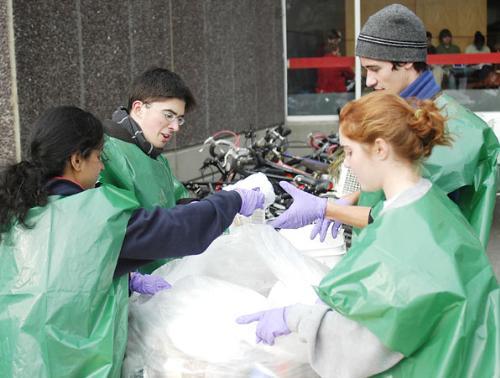
News
Summers Will Not Finish Semester of Teaching as Harvard Investigates Epstein Ties

News
Harvard College Students Report Favoring Divestment from Israel in HUA Survey

News
‘He Should Resign’: Harvard Undergrads Take Hard Line Against Summers Over Epstein Scandal

News
Harvard To Launch New Investigation Into Epstein’s Ties to Summers, Other University Affiliates

News
Harvard Students To Vote on Divestment From Israel in Inaugural HUA Election Survey
REP Completes Waste Audit

On a cold and windy Veterans Day, representatives from the Resource Efficiency Program (REP) participated in their seventh annual Waste Audit, sorting through a random sample of garbage generated across campus.
From 10 a.m. to 2 p.m. yesterday, REP members, clad in green ponchos and purple gloves, gathered outside the Science Center to weigh and sort the contents of garbage bags into five categories: paper, compostables, reusable, cans, bottles and actual trash. The amount in each category was then weighed to help REP get an idea of how much trash Harvard isn’t recycling.
REP Co-captain Lindsay E. Crouse ’06 said that the goal was to sort through at least 50 of the 85 bags collected earlier in the week from Houses, freshman dorms and some academic buildings.
“We’re seeing a lot of paper, especially newspapers, lots of Crimsons, and lots of bottles,” Crouse said. “We want to make students more aware that recycling is really easy. When they throw away one bottle, it turns into this,” Crouse said, pointing to the pile of cans and bottles she had found in the trash bags.
“One-fourth to one-half of the trash could definitely have been recycled,” said Jeremy P. Tchou ’08, a Yard representative for REP.
Caitlin L. McLoon ’07, a Winthrop representative for REP, said that “half-used” birth control pills were her most interesting find, while Tchou cited Annenberg dishware.
“Somebody must have gone on a big shopping spree,” Robert M. Gogan, manager of recycling and waste for Facilities Maintenance Operations said, holding up three shoeboxes and some Styrofoam packaging.
Harvard pays $90 to dispose of every ton of trash, compared to $68 per ton of compostables and $25 per ton of cans and bottles recycled, Gogan said. And the University actually gets paid $35 for each ton of paper and cardboard recycled.
After last year’s waste audit, REP discovered that 42 percent of the trash collected could have been recycled. Figures from this year’s audit were not yet available.
Gogan said he has seen an improvement in overall recycling over the past seven years. “We used to recycle 16 percent and last year we recovered 38 percent.”
Harvard is ahead of campuses like the University of Pennsylvania, where only 22 percent of trash is recovered for recycling, but behind Dartmouth and Middlebury, where over 60 percent of trash is recycled, Gogan said.
REP hopes that eventually 50 percent of Harvard’s trash will be recovered for recycling.
REP coordinator Allison I. Rogers said that Harvard’s trash is sent down to South Carolina, and “the fuel emissions that occur [have] a harsh impact on our environment.”
On Monday, REP will use one day’s worth of trash bags collected from the Yard to construct “Mt. Trashmore” and “Mr. Recyclemore” in front of the Science Center.
Want to keep up with breaking news? Subscribe to our email newsletter.
